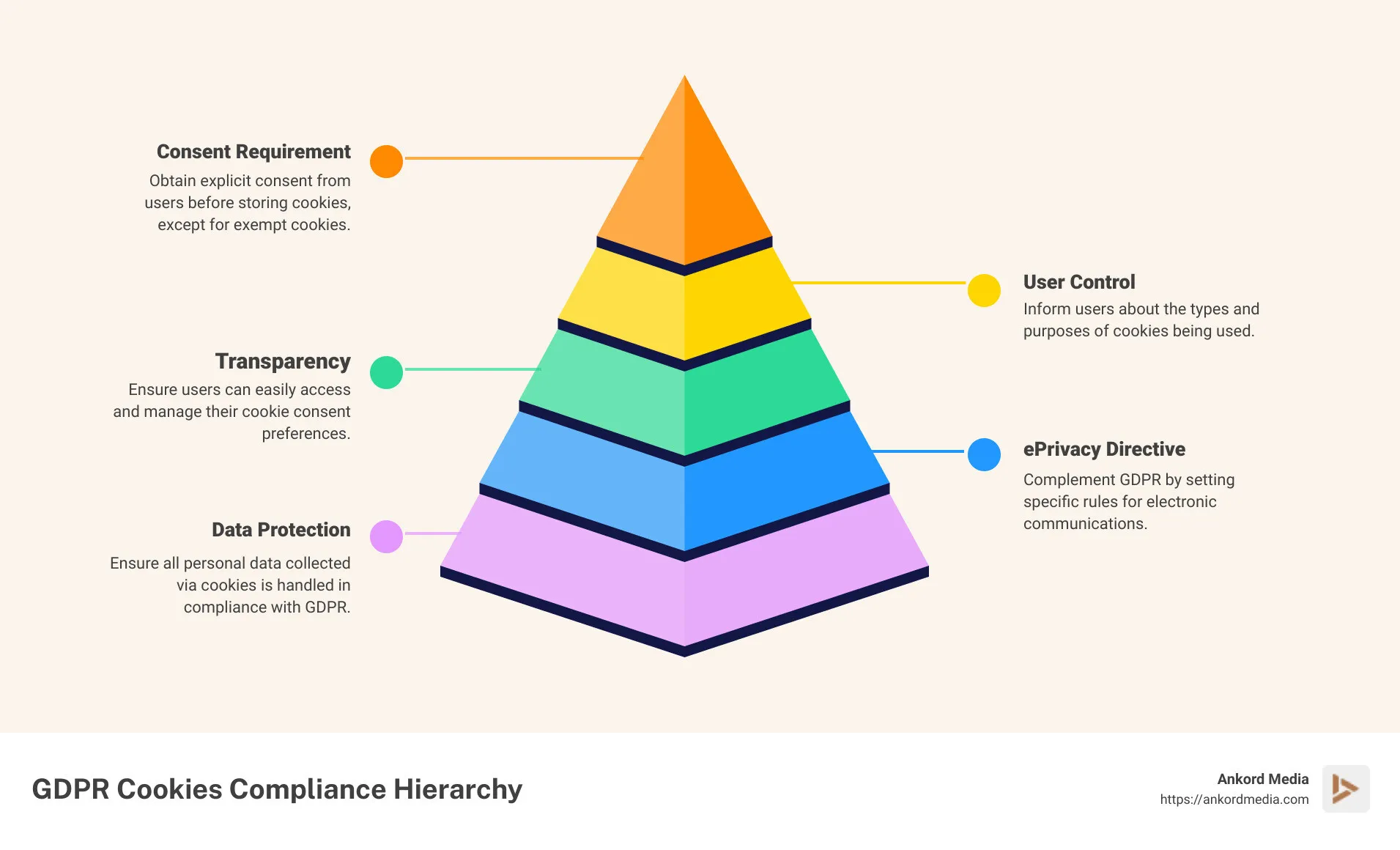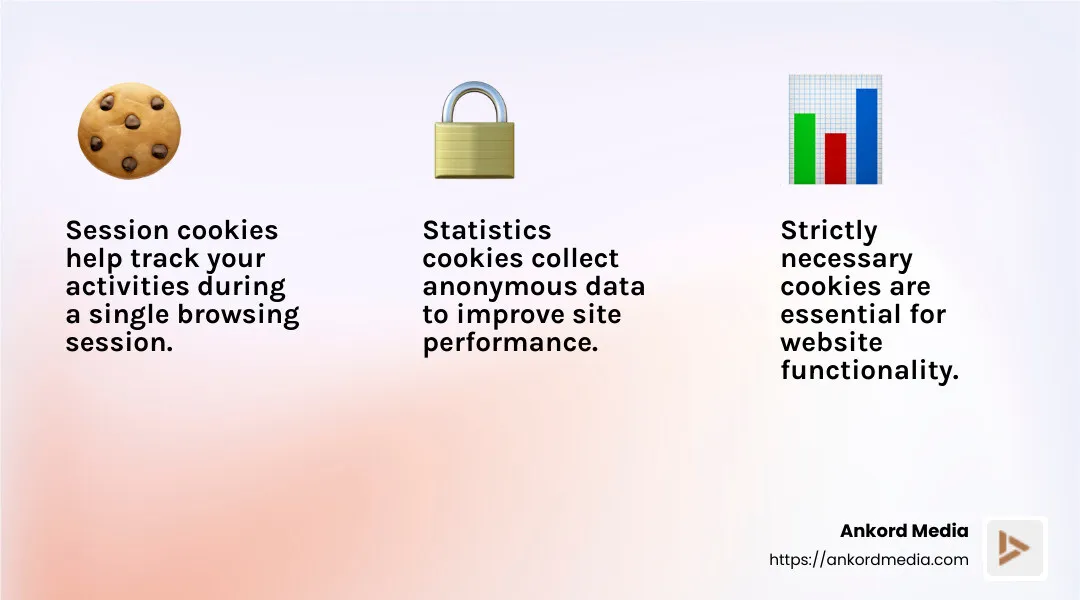
GDPR cookies are pivotal in today’s digital landscape, providing a crucial balance between user privacy and business analytics. At its core, the GDPR (General Data Protection Regulation) sets strict guidelines on how businesses should handle personal data, including information gathered through cookies. Here’s a quick breakdown of what you need to know about GDPR cookies:
- Consent Requirement: Before storing cookies, consent must be obtained from users, except for certain exempt cookies.
- User Control: Users should easily access their consent preferences and withdraw consent anytime.
- Transparency: Businesses need to inform users about the types of cookies in use and their purposes.
The ePrivacy Directive complements the GDPR by setting specific rules for electronic communications, focusing heavily on the consent and transparency surrounding cookies.
I’m Milan Kordestani, and I'm passionate about simplifying complex topics like gdpr cookies for visionary entrepreneurs. With my experience in brand elevation and strategic guidance, I help businesses connect more deeply with their audience while navigating the intricacies of digital privacy. In understanding gdpr cookies, companies can make informed decisions that foster trust and compliance. Let’s dive deeper into this fascinating topic.

Gdpr cookies helpful reading:- ADA Website Compliance- GDPR
Understanding GDPR Cookies
When you visit a website, you may notice a pop-up asking for your permission to use cookies. This is all about cookie consent, a crucial part of GDPR compliance. But what exactly are these cookies, and why do they matter?
Cookies are small text files stored on your device, and they play a big role in how websites operate. They can remember your preferences, like language settings or items in your shopping cart. However, they also have the potential to track your online activity, which raises privacy concerns.
Personal Data and Online Identifiers
Under the GDPR, certain types of cookies are considered personal data. This means they can identify you, directly or indirectly, through unique identifiers. For example, a cookie ID or an IP address can be linked back to an individual, making them subject to GDPR rules.

Online identifiers, such as cookie IDs, IP addresses, and device fingerprints, are key elements in this context. They help websites recognize returning users and tailor their experience. But they also require careful handling to ensure user privacy.
The Role of Consent
The GDPR emphasizes the importance of obtaining clear and explicit consent from users before collecting or processing personal data through cookies. This means users should be informed about:
- What data is being collected: Users need to know the kind of information the cookies will gather.
- Why the data is collected: The purpose behind the data collection must be clearly stated.
- Who is collecting the data: It's important to inform users about the parties involved, especially if third-party cookies are in use.
For consent to be valid, it must be freely given, specific, informed, and unambiguous. This means no pre-ticked boxes or vague language. Users should also have the ability to withdraw their consent easily, without facing any problems.
In summary, understanding GDPR cookies involves recognizing their potential impact on privacy and ensuring that consent is obtained transparently. By adhering to these principles, businesses can build trust with their users while staying compliant with GDPR regulations.
Types of Cookies and Their Purposes
Cookies come in various flavors, each with its own purpose and lifespan. Understanding these can help you steer GDPR cookies more effectively.
Session Cookies vs. Persistent Cookies
- Session Cookies are like temporary notes. They exist only while you're browsing a website and disappear once you close your browser. They help with tasks like keeping track of your shopping cart items as you steer through an online store.
- Persistent Cookies stick around even after you close your browser. They have a set expiration date and help websites remember your preferences, like language settings or login information, for future visits.
First-Party Cookies vs. Third-Party Cookies
- First-Party Cookies are placed on your device by the website you're visiting. They're essential for basic functionalities, such as remembering your login credentials or keeping items in your shopping cart.
- Third-Party Cookies come from external sources, like advertisers or analytics providers. They track your online behavior across different sites, often for targeted advertising. These cookies are the ones that usually raise privacy concerns.
Cookie Purposes
- Strictly Necessary Cookies are essential for a website to function. They enable basic operations like page navigation and access to secure areas. Without them, the site may not work properly.
- Preferences Cookies store your personal settings, such as language or region preferences. They make your online experience smoother by remembering your choices.
- Statistics Cookies gather anonymous data about how visitors use a website. They help website owners understand user interactions and improve site performance.
- Marketing Cookies track your online activity to deliver targeted ads. They can share information with advertisers to create personalized advertising experiences.

These different types of cookies each serve a unique role in enhancing or personalizing your online experience. However, they also highlight the importance of transparency and consent, especially when it comes to third-party and marketing cookies, which can track your activity beyond a single website.
By being aware of these distinctions, you can make informed decisions about which cookies to allow and maintain control over your online privacy.
GDPR Cookie Compliance Requirements
To comply with the GDPR when using cookies, websites must follow strict rules. These rules revolve around gaining explicit consent, using cookie banners, managing user consent, respecting user rights, and processing data correctly.
Explicit Consent
For a website to place cookies on a user’s device, it must first obtain explicit consent. This means users must actively agree to the use of cookies before any data collection begins. Pre-ticked boxes or implied consent through continued site use aren't enough. Users need to perform a clear action, like clicking an "Accept" button, to show their agreement.
Cookie Banners
Cookie banners are the pop-ups you see when you first visit a website. They inform users about the site's use of cookies and ask for consent. A compliant banner must provide:
- Clear information about the types of cookies used
- The purpose of each cookie
- Options to accept or reject non-essential cookies
These banners should not obstruct the user's ability to access the site if they choose to decline cookies.
Consent Management
Managing user consent is crucial for GDPR compliance. Websites often use consent management platforms (CMPs) to handle this process. These platforms:
- Store user consent securely
- Allow users to change their cookie preferences anytime
- Provide records of consent for legal documentation
Tools like Cookiebot CMP simplify this process by automatically blocking cookies until consent is given.
User Rights
Under GDPR, users have specific rights concerning their data:
- Access: Users can request to see what personal data is collected.
- Rectification: Users can ask to correct inaccurate data.
- Erasure: Users can request their data be deleted.
- Objection: Users can object to the processing of their data.
Websites must ensure these rights are easy to exercise. Providing clear instructions in a privacy policy or through a user-friendly interface helps achieve this.
Data Processing
Data collected through cookies must be processed lawfully and transparently. Websites need to:
- Clearly state the purpose of data collection
- Use data only for the specified purposes
- Ensure data security to protect against unauthorized access
Regularly reviewing and updating data processing practices can help maintain compliance and build trust with users.
By adhering to these GDPR cookie compliance requirements, websites not only avoid hefty fines but also foster a transparent and trustworthy relationship with their users. This approach aligns with Ankord Media's commitment to crafting impactful digital experiences that respect user privacy.
Frequently Asked Questions about GDPR Cookies
Does GDPR allow cookies?
Yes, the GDPR does allow cookies, but there are strict rules to follow. The key is cookie consent. Websites must ask users if they agree to the use of cookies before placing them on their devices. This is often done through a cookie consent banner, which is a small notice that pops up when you first visit a site.
The banner should clearly state:
- What cookies are used
- Why they are used
- How users can manage their preferences
Users must give explicit consent—a clear "yes"—before any non-essential cookies are activated. Simply scrolling or ignoring the banner doesn't count as consent.
What is the GDPR compliant cookie notice?
A GDPR compliant cookie notice is more than just a pop-up. It is a detailed cookie policy that explains how cookies and other tracking technologies are used on the site. This policy should be easy to find and understand.
Key elements of a compliant cookie notice include:
- A list of all cookies used, their purposes, and their duration
- Information on how users can control or reject cookies
- Details on how the website processes personal data
The notice must be straightforward, avoiding legal jargon, so users can easily grasp how their data is being used.
How does cookie consent fit with GDPR?
Cookie consent is a fundamental part of GDPR because it relates to the lawful basis for processing personal data. Under GDPR, consent must be:
- Freely given: Users should have a real choice and not feel pressured.
- Specific: Consent should cover specific purposes, not a blanket agreement.
- Informed: Users must know what they are consenting to.
- Unambiguous: Consent must be a clear, affirmative action.
Websites must allow users to manage their preferences easily, providing options to accept or reject different types of cookies. This empowers users to control how their data is used, aligning with GDPR's emphasis on user rights and data protection.
By understanding and implementing these consent requirements, businesses can ensure they process personal data responsibly and maintain trust with their users. This aligns perfectly with Ankord Media's mission to create digital experiences that honor user privacy and foster strong customer connections.
Conclusion
Navigating the complexities of GDPR cookies is crucial for any business operating online today. At Ankord Media, we understand the importance of building digital experiences that not only captivate but also respect user privacy. Our approach to branding and design is rooted in creating authentic connections with customers, and this includes ensuring compliance with all relevant data protection laws.
Why does this matter?
Every interaction is an opportunity to build trust. By adhering to GDPR cookie compliance, businesses demonstrate their commitment to protecting user data. This not only helps avoid potential legal pitfalls but also strengthens the bond between a brand and its audience. We believe that a transparent and user-focused approach to data privacy is a cornerstone of effective branding.
Our Promise
At Ankord Media, we specialize in changing bold ideas into successful digital experiences. We partner with visionary clients to craft impactful stories and design solutions that resonate with their audience. Our expertise in strategic branding and cutting-edge technology ensures that your brand not only meets but exceeds expectations.
By integrating GDPR compliance into your digital strategy, you improve your brand's credibility and foster lasting customer relationships. Let us help you steer the changing landscape of digital privacy and design a future where your brand thrives.
To learn more about how we can help you create compelling and compliant digital experiences, visit our services page.


